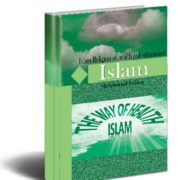Meaning/ Translation of Ghosl (Ablution) in english:
ab·lu·tion
noun
noun: ablution; plural noun: ablutions
-
the act of washing oneself (often used for humorously formal effect).
“the women performed their ablutions”
-
a ceremonial act of washing parts of the body or sacred containers.
late Middle English: from Latin ablutio(n-), from abluere, from ab- ‘away’ + luere ‘wash.’ The original use was as a term in chemistry and alchemy meaning ‘purification by using liquids,’ hence ‘purification of the body by washing’ (mid 16th century).
The history of “Ghusl” goes back to the time that Adam and Eve were living. As stated, Adam and Eve have performed “Janabat Ghusl” [3]. Also, Seth (Son of Adam) and Gabriel (the angle) have performed “Mayat Ghusl” on Adam after his death [3]. Moreover, performing different kinds of ablution exists in a number of religions and schools of thought, and nations such as people of Lot (the prophet), Dhul-Qarnayn, John (the prophet) as well as ancient Egyptians [10], Hindus, Cherokees (Indians), Zoroastrians, Jews, Christians, and etc.
For instance, ancient Egyptians had performed ablution twice a day in cold water. In Zoroastrianism, ablution was a part of the set of acts that a person needed to perform in order to be a priest. In Judaism, the people had to perform ablution in order to be able to enter sacred places and one of the places that the ablution could take places was called “Mikveh”. In Christianity, baptism is a rite that is performed in the ceremony of admission to the church with Trinitarian invocation, “I baptize you: In the name of the Father, and of the Son, and of the Holy Spirit.” The candidate may be wholly or partly immersed in water, the water may be poured over the head, or a few drops may be sprinkled or placed on the head.

Etymological Study
In this section, we investigate the words that are used in Quran and imply on the act “Ghusl” from etymological point of view. The first word is derived from the root “غسل” (Ghasala) which means “washing” [6]. Derivatives of “ghusl” might result in different meanings such as “hitting” or “sweating”. The second word is derived from root “طهر” (Tahara) which means “sanitizing” or “purifying”.
Ghusl in Quran
The word “غسل” (Ghusl) and its derivatives are used in Quran 4 times that only one of them implies on the act “Ghusl” (Surat An-Nisa:43) and the other three ones are related to just washing (Surat Al-Ma’idah:6, Surat Sad: 42, Surat Al-Haqqah: 36). In addition, the word “طهر” (Tahara) and its derivatives are used in Quran 31 times that only one of them related to the act “Ghusl” (Surat Al-Ma’idah:6). The way of performing the “Ghusl” is never mentioned in Quran.
Analysis of Hadiths (Narrations)
In this research, no hadiths were found in which prophet Muhammad (pbuh) teaches performing Ghusl. Also, the two terms “Squential Ghusl” or “Ghusl Tartibi” (Persian: غسل ترتیبی) and “Ghusl Irtimasi” (Persian: غسل ارتماسی) wasn’t found to be used directly in the hadiths and Islamic narrations. It seems that these two terms are more due to peoples’ interpretation of Hadiths and narrations.
Based on the narrations, that some of them are attributed to Prophet Muhammad’s wives, it can be concluded that in performing Ghusl, washing the whole body is crucial. However, based on the fact that Prophet Muhamad preferred to perform everything (such as brushing the teeth) first on right side of his body and second on his left, it is plausible to conclude it is not crucial to perform the Ghusl first on right side and then left side, however it is preferred. Moreover, no strong reasons were found to prove the up-down sequence in Ghusl (first washing the upper part, head and neck, and then the lower part). In addition, washing inside of the nose and mouth is not obligatory in Ghusl.
Here, some examples of narrations about Ghusl in the Islamic literature are presented.
Ja’far al-Sadiq: If you want to do Mazmazah (washing the mouth) or Estinshaq (washing inside of the nose), do it. But, it is not vajib (obligatory) since external parts of body should be washed in the Ghusl, not internal. [4]
Prophet Muhammad (pbuh): if somebody, as the Ghusl, goes completely under the water including the head that is enough. [12]
Aisha: Whenever the Prophet Muhammad (pbuh) took a bath after Janaba he firstly washed his hands and then performed Wuzu (partial ablution). Then, he would make his fingers wet and move the roots of his hair with them, and then pour three handfuls of water over his head and then pour water all over his body. [11]
Conclusion
In the Ghusl, washing the whole body is Vajib (obligatory). But, there are no evidences of proof for the order of washing, i.e. first head and necks should be washed and then the other parts of body, or first right side of the body should be washed, then the left side.
References
[1] Sahih Al-Moslem
[2] Vasele Al-Shie’, Sheikh Hor
[3] Behar Al-Anvar, Allameh Majlesi
[4] Elal Al-Sharaye’, Sheikh Al-Sadooq
[5] Ghesas Al-Anbia’, Sa’labi
[6] Ghamous Almaany, Firoozabadi
[7] Dehkhoda Encyclopedia
[8] Britannica Encyclopedia
[9] Jewish Encyclopedia at www. Jewishencyclopedia.com
[10] Histories, Herodotus
[11] Sahih Al-Bukhari
[12] Man La Yahzarah Al-Faqih, Abu Ja’far Muhammad ibn ‘Ali ibn Babawaih al-Qummi













